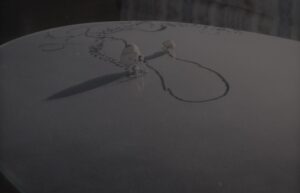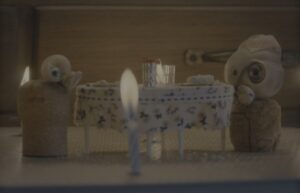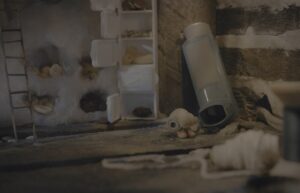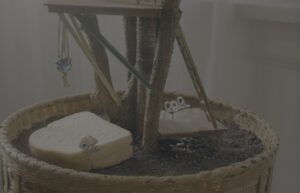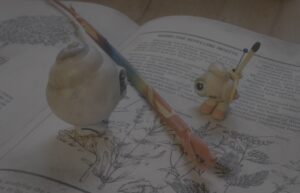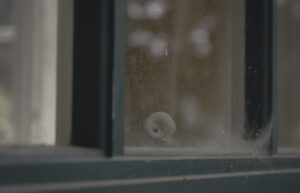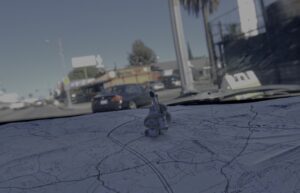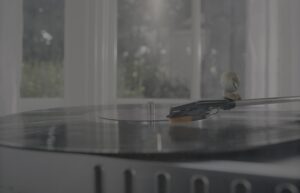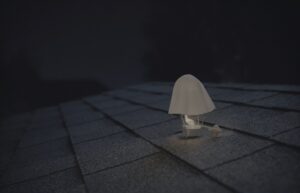I happen to be very online, but I know not everyone is. So I don’t want to throw a very Twitter-coded word like “nicecore” at the top of a review and assume every reader will automatically have a clue what I mean. Urban Dictionary (it’s online) defines it as entertainment that has “a story with altruistic actions and an optimistic view on others and the world around them”. Nicecore takes the empathy and sunshiney good vibes of feel good cinema and puts them in their most thoughtful and artful form. Nicecore masterpieces aren’t simply nice, sweet films but films that marry sweetness and kindness to an auteur vision and sharp writing. They soup up lovability and empathy with a V8 engine and a roll bar. If Ebert called movies empathy machines, nicecore films are empathy drag racers. These nice films are equipped to compete with the power and cerebral thrust of the best art films out there. Wholesome guilt-free cinema without a trace of overwrought schmaltz. I’m happy to say I finally saw 1995’s nicecore world-beater, Babe, a canonized classic of decency. But if I had to assemble a Mount Rushmore of recent nicecore opuses (a Mount Nicemore, if you will), my first three are probably lookin at something like this: Paddington 2, Boyhood, It’s A Beautiful Day In the Neighborhood. The fourth and final spot (let’s call it the Teddy Roosevelt spot) would then go to Dean Fleischer-Camp’s marvelously generous and compassionate partial stop-motion triumph, Marcel the Shell With Shoes On. The winning 2022 gem is an impeccably realized feature length expansion of Fleischer-Camp’s (and star Jenny Slate’s) beloved series of 2010s YouTube shorts about a good-natured, soft-spoken shell who wears sneakers and offers gentle observations on being a tiny piece of calcium carbonate in a massive, hectic world. It’s not only a perfect work of adaptation, but it manages to plug a ticklish piece of 2010s pop culture into the strange, Twitter-dominated 2020s in a way that feels relevant and insightful. We all knew a Marcel movie would be nice, but its humble confidence in its own timely wisdom is what elevates it to the heights of nicecore greats. Somwhere, Farmer Hoggett is looking down at this charming little shell and nodding approvingly. That will more than do.
Marcel the Shell with Shoes On takes place in our present moment, where a recently separated man moves into an AirBnb and finds that he is not the only lifeform there. He befriends a young shell (a boy, though he is voiced by a tremendous Jenny Slate) named Marcel and his surrogate shell grandmother Nana Connie (Isabella Rosselini, splendidly moving). As in the adorably lo-fi YouTube shorts, the appeal of the film is having the sweet, dryly hilarious Marcel show us the world from a shell’s perspective. He uses a tennis ball as a car, a slice of Wonder Bread as a mattress, and MacGyvers an electric egg-beater and some rope to ingeniously knock fruit out of the backyard’s trees (the way the two shells construct rope produces one of the film’s many big laughs). While each understated observation or pearl of soft wisdom is delightful, Marcel the Shell with Shoes On is blessedly much more than an excuse to make more charming Marcel vignettes. There’s an overarching story right from the beginning, which only grows more affecting and emotionally layered as its 93 minutes sail by. Marcel and Nana used to have a proper family of shells (Marcel explains that twenty is the minum number needed to form a community) before the human couple who once lived here had an acrimonious breakup. It’s thought that one of them accidentally packed most of the household’s tiny denizens into a suit case and unwittingly left with them. We enter the story with Marcel and Nana working hard to survive and stay healthy all by their lonesome, but the new presence of this human filmmaker (played more than ably by Marcel creator Dean Fleischer-Camp) has clearly been like water in the desert for them. In time, Marcel is able to regain even more connection with the world when Dean uploads his video interviews with Marcel to the Internet and the demure shell suddenly becomes an unexpected viral celebrity. Most importantly, the surprise of gaining the megaphone of Internet fame gives Marcel new ways to search for and hopefully find his family. What follows is an overwhelmingly humane, consistently funny and enchanting meditation on family, friendship, loneliness and the strange paradox of connection and alienation that is today’s Internet culture. It’s a feather-light, petite animated comedy that somehow manages to say volumes without raising its voice above a whisper.
The bloom on Ted Lasso‘s English rose fell off in 2023 with its misjudged final season. But nicecore fans like myself will always have that perfect, lusciously empathetic first season and that is maybe what Marcel the Shell with Shoes On most puts me in mind of. Both are the result of humble origins. Ted Lasso started as humorous interstitials played on ESPN between commercial breaks. Marcel is a little different insofar as those 2011 shorts received considerable acclaim. But its beginnings were, like its indefatigably positive protagonist, small. On some level, the feature length Marcel has all the elements that made the shorts so sweet and winning. Droll observational humor. An overflowing feeling of optimism. A giddy DIY sensibility and a glee found in inventing new uses for ordinary household objects. The full-length film keeps the recipe intact. As opposed to Guillermo del Toro’s Pinocchio, Marcel the Shell isn’t a radical act of adaptation but rather a faithful expansion of the shorts into a 93-minute form. The delicacy with which it turns a small, lo-fI Internet curio into a larger work of art is maybe its most impressive quality. There is no straining to make this bigger. Strain and sweat are anathema to Marcel the Shell with Shoes On. Humble, understated confidence is the core of its personality. Moreover, Marcel the Shell doesn’t simply manage to stretch itself to feature length in an organic way (though it certainly succeeds there). It uses the extra time to work in the things truly great films tend to have. Ton. Emotional Intelligence. Emotional variety at that. Wonderful humor and breath-catching pathos (this won our annual Damp Face Award in an absolute rout). Rich themes. Real performances. Both Slate and Rossellini would have been inspired Oscar nominees and together they make the best argument for adding a category for Best Voice Performance in an age. In its soft, subtle way, Marcel the Shell with Shoes On is one of the most astounding, assured works of adaptation I can name. It takes the seed of some charming shorts from a decade ago and nurtures them into something wonderful and flowery.
Last year, I was proud to be one of the crew critics to find room in their year-end list for Bo Burnham: Inside and to name it the first brilliant movie about the COVID lockdown experience. I can now say that it has exceptional company, even if Marcel the Shell With Shoes On is less literally about the pandemic. What it is about on an emotional level is the loss of social connections and the anxiety over suddenly not having people physically around. The film opens with Marcel and Nana Connie already well into a period of extended isolation from other shells, and we sense some time has passed since this house’s last human occupants left in a trail of rancor and miscommunication. We meet our main characters around the time our surrogate director (stepping very naturally into his own film) is getting to know them and we pick up how relieved everyone is to finally have another soul to talk with. It is a lovely film about the wonder of bonding with someone, made deep and wise by its acute sense of how much it hurts to lose someone. It is quietly (as is its way in all aspects) about some painful things, but, like its nicecore colleague, one Paddington Bear, it walks through that pain bravely and with radiant positivity. It is a film about finding your way back to ahppiness and back to something that feels like normalcy. It is about rediscovering touch and fellowship, and it reduced me to smiley tears. It disarmed me like the hug of a loved one I hadn’t seen in far too long. In thinking about how a traumatized society tries to reconnect, it is also a great film about that double-edged sword of connection: the Internet. I recall Joseph Gordon-Levitt feeling that The Social Network was too cynical about the web, about its potential for organizing people and giving them new ways to rally together for justice. Marcel the Shell sees that potential, even expresses sincere awe for it. But it also has a sneaky wit about how it views the Internet, and it uses that wit to puncture the ego and narcissism that come along with web culture. Yes, the Internet does offer the tools to start a protest, raise money for a person in need, or help a shell find his lost community. And that’s a wonderful thing, but let’s be honest, Marcel says with justice, charity and kindness aren’t the only (or even main) things social media is used for.
Bo Burnham: Inside and Marcel the Shell with Shoes On have COVID in common, but these two sherpas through isolation, melancholy and the absurdism of the Internet could not be more different. Where Bo Burnham acts as a kind of demented carnival barker, Marcel the Shell is a saintly figure of light. There’s enough genuine sadness in Marcel to make your eyes tear up but the hilarity and eloquent kindness of the film always keep despair away. It sweetly coos into the void where Bo Burnham howled. The film never succumbs to sorrow, just lightly surfs on top of it- except it’s Marcel the Shell with Shoes On, so substitute the surfboard for a guitar pick or something. Fleischer-Camp’s Faberge triumph is unsurprisingly not just a nice film but a film (like all great nicecore films are) about the mighty power of niceness. It’s about how compassion helps lead you through a weary, fraught world. Films like these are not simply about compassion as a shield against adversity but how compassion helps us do more than just bear our hardship. They are about peacefully weaponizing kindness. Empathy allows us to keep our wits, flourish, and keep our hearts from hardening. Marcel mourns the loss of his community, but he sees the good that can come from surviving this stressful chapter. He’s picked up a self-sufficiency and self-confidence that will still be with him when happier times return. The movie’s true moment of conflict comes when Marcel starts to worry about Nana Connie and his courage and appetite for life begins to flag. His surrogate grandma corrects him. We cannot let the inevitability of loss steal our joy. We must live in the face of these hard things. Then she gently whispers, “I like you brave.” and reader, I can now confirm that even writing out the dialogue from Marcel the Shell with Shoes On is enough to turn my eyes into twinkly puddles.
Giving out the Damp Face Award each year has become my favorite tradition on the whole film calendar. For one thing, it is my way of saying how much I value films that work your emotions from top to bottom. And, fittingly for the second COVID masterpiece, I think a film like this really knows how much bottled up tension we still have to release. It’s a movie that does everything it can to make your emotions flow; the very essence of catharsis. Some cynics might dismiss that as manipulative tear-jerking, but the idea of Marcel the Shell with Shoes On jerking or manipulating anything is laughable. It’s miraculously effortless in how it engages so many feelings without coming on too strong. With its gossamer aesthetic, it is incapable of coming on too strong. It not only expertly finds joy and humor in the everyday, but it makes all its emotional epiphanies feel interconnected. For Marcel the Shell, there is not just joy and sorrow but an entire vibrant emotional spectrum that are all part of one grand human instrument. If you still mistrust a movie that plays you like a fiddle, you probably haven’t been played this skillfully, sweetly and gorgeously in too long. There’s a feel of “how did they just do that” to this whole film. How did they make a precocious stop motion web short feel this full, not only in length but in richness? How is a lo-fi animated movie this powerful? How did they not only come up with so many ideas for a film about a good-hearted, sneaker-clad shell but knit them all together so cohesively? How is a movie this smart about web culture so unfailing empathetic; so free of any of the Internet’s trademark cynicism? How does the best all-ages film in, uh, an age also have the year’s funniest stoner joke? While Pixar (which, to give due credit, made its best film in a while in 2023) is still working to regain its elite form, a small team of animators stepped up and made a film with all the hilarity, wonder, sweetness, great acting and depth of golden age Pixar. The how of it all is fun to puzzle over but eventually does not matter. What matters is that our often sad world is full of kindness and beauty and that sometimes, when we most need it, a film like this comes along to hug us until we remember.


